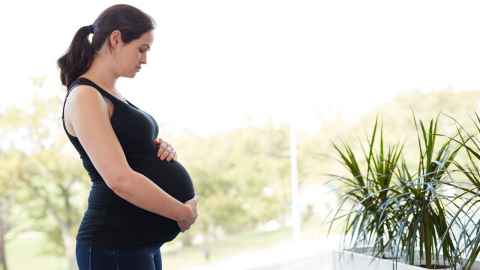Could fish oil in pregnancy prevent weight-related health issues in children?
28 February 2018
Research underway in Auckland could give expectant mothers a new, simple way to improve the lifelong health of their child.

Researchers from the University of Auckland-based Liggins Institute are seeking pregnant women in the upper BMI range to join the clinical trial, which will investigate whether fish oil supplements taken during pregnancy could help prevent children from developing weight problems and related issues such as diabetes later in life.
Study lead Dr Ben Albert says: “We already know that if you carry extra weight while you are pregnant, your child is more likely to develop weight problems and diabetes as they grow up.
“Women who are pregnant try incredibly hard to improve their health to give their baby the best start. But what should they do? Is there something simple they could take? Our previous work suggests fish oil may be protective for the developing baby.”
Half of the 160 women in the new trial will take fish oil capsules during pregnancy and for three months after birth while the rest take placebo (olive oil) capsules.
Women who are less than 16 weeks pregnant, aged 18-40 and with a BMI of 30 - 45 can participate in the trial. The goal is for a third of participants to be Māori and another third Pacific women.
“We know that Māori and Pacific women are affected by weight problems even more than other New Zealanders, so it’s really important they’re part of this study,” says Dr Albert, who is a Research Fellow at the Institute and paediatrician at Starship Hospital.
Dr Albert has led a series of studies into the health effects of fish oil supplements. In a study published last year, his team found that fresh fish oil given to overweight pregnant rats prevented their offspring from developing a major diabetes risk factor. Other evidence suggests omega 3 fatty acids in fresh fish oil improve the way insulin works, which protects against diabetes and related diseases.
Women who are pregnant try incredibly hard to improve their health to give their baby the best start. But what should they do?
But Dr Albert is not advising mothers-to-be to take fish oil supplements until they can be confident the supplements they buy are fresh. In an earlier study, his team tested samples of 36 fish oil capsule brands sold in New Zealand and found that most – 83 percent – were rancid, oxidised beyond international recommended levels.
How “off” they were had nothing to do with best-before date, price, or the country they came from.
And when the researchers fed highly oxidised fish oil to pregnant rats in a later experiment, a third of their pups died.
“If we find in our clinical trial that taking fresh fish oil during pregnancy has the same protective effect in humans it does in rats, that would further strengthen the case for some kind of independent, regular testing of fish oil supplements,” says Dr Albert.
Ben Albert
“Until then, our best advice is for pregnant women to eat fresh fish. We can assure the women in our study that the fish oil supplements will be fresh.”
The wider challenge – of breaking the intergenerational cycle of weight-related health problems – is tough and will require multiple long-term strategies across our society, he says.
“But improving the health of mothers while they are pregnant is one really powerful approach because the unborn baby’s environment in the womb has lifelong effects on how their bodies work.
“I am increasingly seeing children in my clinic with serious weight problems, many of them with complications like diabetes that we used to see only in adults. If we could reduce this with a safe, accessible, food-based supplement, it could make a real difference for thousands of families.”
The trial is funded by the Health Research Council, and a funding collaboration between Cure Kids and Government-funded National Science Challenge A Better Start. Results are expected in 2020.
Media queries
Nicola Shepheard | Media Adviser
Tel: 09 923 1515
Mob: 027 537 1319
Email: n.shepheard@auckland.ac.nz